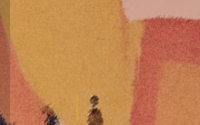The hit screening of “Flowers” once again set off a wave of enthusiasm about Shanghai. There have always been countless novels describing Shanghai. Some people say that Zhang Guangtian’s new work “The Future” is an “800,000-word love letter” dedicated to Shanghai. There are both old Shanghai and new Shanghai in the book, including Aunt Vera who speaks Shanghainese on Henry Road, Allen Ginsberg under the sycamore tree, doctors with special skills in the surrounding towns… outsiders from different time and space. and locals alike point to the future with the help of the past.
Avant-garde dramatist, musician, poet, novelist, Zhang Guangtian has many identities as a creator. Zhang Guangtian was born in Shanghai in 1966. He studied medicine, formed a rock band and a folk band, and sang poetry everywhere. Many well-known movie music were composed by him (“The Day Leaving Lei Feng”, “Shake, Shake, Shake to Grandma’s Bridge”, “Armed Forces Behind Enemy Lines”, etc.).
His identity as an avant-garde dramatist is also well-known in the circle. From “Che Guevara” in 2000 to later “Mr. Lu Xun” and “Sage Confucius”, he has caused “earthquakes” in the theater art world. He is also a professor at the Central Academy of Fine Arts, serving as a tutor in the direction of “Methodological Narration and Performance”. In recent years, his literary works have begun to emerge, and his latest work is “The Day to Come”. This interview starts with Zhang Guangtian’s creative feelings and unfolds his unique path of artistic exploration.
“The Future Can Be Chased”, written by Zhang Guangtian, Sichuan Literature and Art Publishing House, November 2023.
Zhang Guangtian’s artistic creation covers a wide range of fields. He is a writer, poet and musician. His directorial films “Che Guevara” and “The Saint Confucius” have become trendsetters in the intellectual community and sparked heated discussions. His plays “Kirkegaard Pills” and “Weeds Scream Indigo Factory” were performed in many countries in Europe and East Asia, influencing the concept of drama outside China. His literary works and multi-category artistic creations are unique, using multidisciplinary methodology to describe and express emotion, which has become his most important artistic practice.
He advocated the Chinese language movement that unified Chinese writing with literature, conducted profound reflection and criticism on vernacular writing since the May Fourth Movement, and emphasized that the first task of writers should focus on language construction.
He is a side branch in the history of avant-garde literature in the past forty years. Some commentators said: “Zhang Guangtian’s creations, from “Meifang” to “Ji Sheng Po”, and now to “The Yue of the Nanrong Family”, their value lies in promoting the narrative attempt of methodology, that is, using the thinking of disciplines other than literature. To transform literature, we can appreciate and appreciate stories with ideas other than the cause-and-effect relationship that we are accustomed to and tired of. The avant-garde literature since the 1980s seems to have stagnated, but Zhang Guangtian’s novels have opened up a new path, and are taking the new generation’s broad taste as the starting point. The new dimension of dominance is fascinating.”
From Zhang Guangtian, a musician, dramatist, and poet, to Zhang Guangtian, a novelist, he uses his sharp thoughts and creations to examine and reflect on his personal creations and literary scenes. His sharp language and thoughts flow along the creations. It has placed a heavy “spiritual burden” on listeners, viewers, readers and artistic colleagues, and has also brought about various baptisms and confrontations.
Watching and reading Zhang Guangtian may be an adventure after another, or an in-depth game of thoughts. It’s like making a play about yourself. The hearts of authors and readers are sometimes so difficult to peer into. And in the end, maybe everyone will return to the pursuit of beauty and their own beautiful things.
Zhang Guangtian wrote in the preface of his latest novel “The Future Can Chase”: “I yearn for beauty, but I am not beautiful.”
Zhang Guangtian, male, was born in Shanghai in 1966. Writer, musician, dramatist. Professor at the Central Academy of Fine Arts, instructor of “Methodological Narration and Performance” at the School of Experimental Art and Science Technology. He has published the novels “Meifang”, “Ji Sheng Po”, “The Yue of the Nanrong Family”, “The Story of Gan Bo” and “The Future Can Be Chased”, the long narrative poem “Yu Guzhi” and the academic work “The Story of Hand Beads”.
